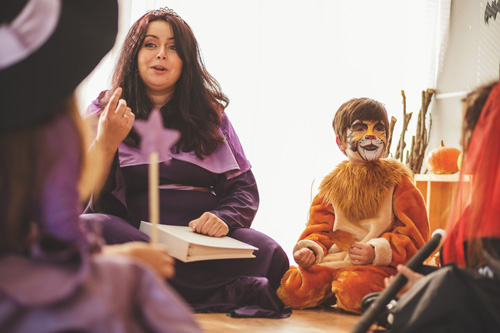
It's a rip-roaring tale. Beautiful princess saves her people! Palace intrigue! Failed assassination plots! The triumph of the underdog! So cinematic; so fun!
But the Purim story, as told in Megillat Esther (the Book of Esther) also provides a great opportunity to talk seriously about modern-day antisemitism.
Explain what antisemitism is, using Haman as your example.
Antisemitism is irrational hatred or stereotyping of Jews. In this story, Haman is the power-hungry, evil advisor to the king. (He is pretty much Scar in The Lion King.) Haman decides he wants to kill all the Jews because one Jew, Mordecai, has refused to bow down to him. (Needless to say, not OK. Would it be OK to kill all the people with blue eyes just because you felt that one person with blue eyes was rude to you?)
Haman tells King Ahasuerus, “There is a certain group of people, scattered all over your kingdom, whose laws are different from other people's and who do not obey your laws. Your Majesty, let me destroy them.” (Not-so-fun fact for grownups: This may be the earliest explicit discussion of antisemitism in an ancient text.) Today's antisemites also believe that Jews aren't loyal to the countries we live in. They think that because we have our own traditions, we're a threat to theirs.
But individuals have the power to fight antisemitism.
After the King divorces his first wife (sigh, long story), he holds a beauty pageant to find a new one. A Jew named Mordecai encourages his niece Hadassah to enter the contest. She's scared, but she understands that if she wins, she'll be in a good position to help other Jews. She changes her name from Hadassah to the less-Jewish-sounding Esther. She's disguising her identity, which, hey, is why we wear costumes on Purim. When people want to hurt or harm you, hiding your identity can be a smart survival strategy. Esther wins the contest! But after she becomes queen, Mordecai learns about Haman's evil plan and urges Esther to tell King Ahasuerus. Despite the risks, Esther reveals herself to be Jewish and reveals Haman's dastardly plot. And the King believes her, and the Jews are saved! The moral: Mordecai and Esther were only two people, but by being brave, they helped everyone. You, too, can be proud of your Jewishness and stand up for fellow Jews.
Remember, we are not alone.
People who protect and help others are called allies. In Megillat Esther, the King and the non-Jews of Persia are allies to the Jews. Today, too, there are lots of good people who stand with us against antisemites. It's important for kids to hear that adults will do their utmost to protect them. Unfortunately, we can't shield them from terrible news; the Purim story is a good way to discuss the fact that there are people out there who don't like us. Bad things sometimes happen. Don't lie about antisemitism; do provide reassurance.
We also have to be allies.
In an entirely separate murder plot, Mordecai overhears two guys from the king's office staff, Bigtan and Teresh, scheming to assassinate the king. Mordecai reports them and saves the king. From this, we can learn that it's important to defend other people as well as ourselves. It's no coincidence that among the mitzvot of Purim are giving charity and giving gifts of yummy snacks to friends and neighbours. Helping others is an important value in this holiday. And building bridges with other communities makes us all safer and happier.
Even in a world that can be scary, joy and celebration are important!
After Haman's evil plans are foiled, the Book of Esther tells us, “LaYehudim hayta orah v'simcha v'sasson v'yikar”; “for the Jews, there was light and gladness and happiness and honor.” What's our takeaway here? Even though antisemitism exists, we shouldn't live in fear. We need fun and friends and books and treats. Make some noise; eat some hamentashen!
More
The Top Seven Things Every Jewish Parent Should Know
How to Talk to Kids About Antisemitism
The Purim Story (For Kids)
About The Author
Marjorie Ingall is the author of Mamaleh Knows Best and co-author of the forthcoming SORRY SORRY SORRY: The Case for Good Apologies.
March 7, 2022